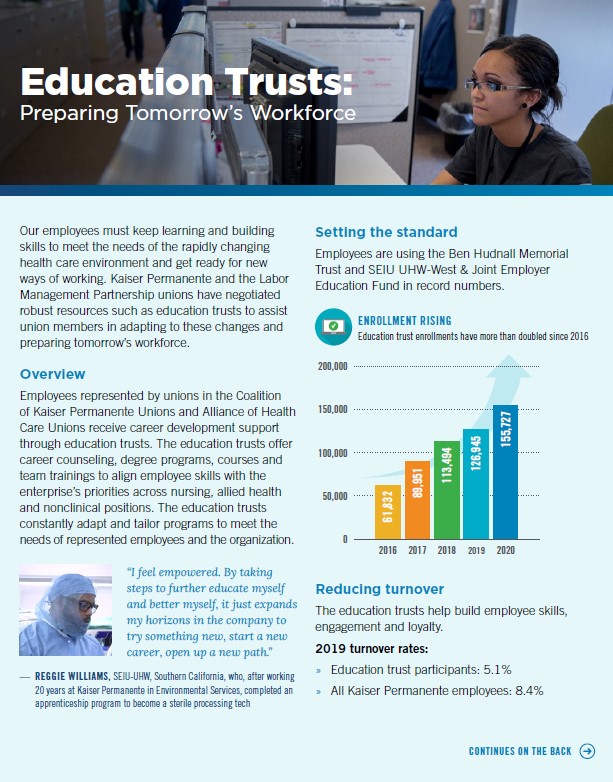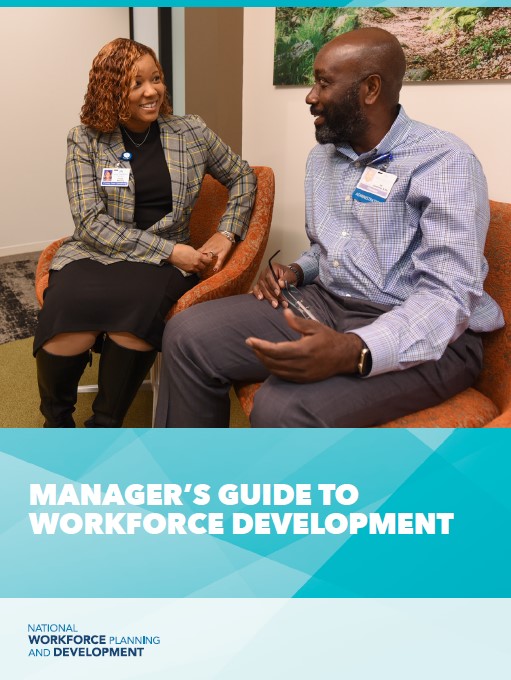Staff Directory
Staff Directory
Staff Directory
Deck
Get tips on the future of workforce learning; view webcast recording for internal use
Even during the COVID-19 pandemic, it's important to make time to learn.
Priscilla Gill and Dawn Nelson of Mayo Clinic emphasized the importance of learning while working during Kaiser Permanente's Future Ready webcast February 25.
"The future of work is about learning," said Gill, director of Workforce Learning. "We all should strive for continuous learning and to be lifelong learners."
"Everyone is some form of a leader," said Nelson, nurse administrator for Education and Professional Development. "Think about how you can grow your personal leadership skills."
Because of the increasing importance of lifelong learning, Labor Management Partnership unions and Kaiser Permanente have negotiated industry-leading resources to assist union members in adapting to change, including tuition reimbursement and education trusts — which had record usage in 2020. Future Ready, hosted by National Workforce Planning and Development, is part of the Workforce of the Future initiative to prepare employees for tomorrow's jobs.
"This is something we've been doing for years and has become even more important with the global pandemic," said Monica Morris, senior director for National Workforce Planning and Development.
3 types of learning
Gill and Nelson agreed, noting the shift this past year to virtual education.
"COVID truly accelerated a lot of our plans," Gill told moderator Peggi Winter, Kaiser Permanente's nurse educaiton leader. "It has indeed moved us at least 5 years into the future."
The webcast, which detailed examples specific to nursing, highlighted learnings that can be applied to many job classifications across Kaiser Permanente.
Mayo Clinic, an integrated health system, emphasizes learning from day one through each career step. This includes learning:
- Experientially on the job
- Socially through learning communities, mentoring and coaching
- Formally with programs, courses, workshops and conferences
"As leaders, we should get to know our staff and understand what their dreams and aspirations are," Gill said. "In doing so, we can help them craft a career plan."
For nurses, learning starts with onboarding, then continues with professional development, a nurse leadership program and nurse leader growth opportunities.
"It is important for staff to be encouraged and guided to find their areas of interest in leadership," Nelson said.
To learn more, view a webcast recording for internal Kaiser Permanente use only.
Videos
()
Kaiser Permanente encourages lifelong learning and job growth for all employees. Learn more about what workforce development can offer you. Visit kpcareerplanning.org.
Deck
Explore Workforce Development Week resources
Kaiser Permanente offers many resources to help you advance your career.
Looking to get started? View sessions from Workforce Development Week and follow these 5 recommendations from the October virtual event.
1. Keep learning.
Kaiser Permanente encourages lifelong learning. Resources range from mentoring to tuition reimbursement for everyone to education trusts for eligible union members.
Sadao Nakachi, an emergency room registered nurse and UNAC/UHCP member in the Southern California Region, advanced professionally by using tuition reimbursement and the Ben Hudnall Memorial Trust to earn bachelor’s and master’s degrees.
Ingris Solares, an SEIU Local 105 member in the Colorado Region, began as a phlebotomist before completing a yearlong apprenticeship program with the SEIU UHW-West & Joint Employer Education Fund to become a medical lab technician.
View their success stories in the Day 1 and Day 2 employee panels.
2. Have a growth mindset.
Feel stuck in your current job? Reframe your thinking, says Michael Brown, vice president of Human Resources in the Georgia Region.
“You’re really not stuck. What you’re doing is developing expertise on that job. It provides you an opportunity to deliver strong results. That is good currency that you can take with you to that next position,” Brown said in a career expert panel.
View a recording of the leader panel.
3. Talk with your manager.
Managers should encourage employees’ career growth, says Kerrin Watkins, Dental Office manager in KP’s Northwest Region. She discusses workforce development with team members to understand their needs, inform them about resources and support their use of education trusts.
“Invest in your employees,” Watkins says. “If you take care of your employees, your employees will take care of your business.”
View Day 3 videos from Watkins and Georgia Region managers Philidah Seda and Sophia Wilson and learn more in the Manager’s Guide to Workforce Development.
4. Follow your professional dreams.
It’s never too late to develop your career, says Dennis Dabney, senior vice president, National Labor Relations and Office of Labor Management Partnership.
When Dabney was 40 and working in Human Resources for an automotive parts supplier, he decided to go to law school. He studied nights and weekends to get his degree. His extra work paid off, opening doors to career growth. Learn more in Dabney’s Day 1 video.
5. Just do it.
Kaiser Permanente employees can receive tuition reimbursement of up to $3,000 each year for successfully completing eligible courses.
Hiren Patel, a senior systems administrator in the Northern California Region, started as a pharmacy tech. He moved up in the organization using tuition reimbursement to get a bachelor’s degree and is currently pursuing a master’s degree.
“Make a plan and be flexible,” Patel says. “Just do it.”
Listen to Patel’s story on the Day 2 launch of the Excel Yourself podcast and explore the event’s website for additional episodes, Ask an Expert sessions, videos and more.
National Workforce Planning and Development hosted Workforce Development Week in collaboration with the Alliance of Health Care Unions and Coalition of Kaiser Permanente Unions.
TOOLS
Deck
Thought leader series offers tips to prepare for tomorrow’s jobs
Will robots replace our jobs?
As technology rapidly reshapes work, the future may be scary, but it’s also filled with opportunities, especially in health care. Kaiser Permanente workers can stay ahead by continuing to learn both technical skills and human skills such as communication and problem-solving, experts say.
“Cultivating our uniquely human skills may be the best way to prepare for an uncertain future,” says Michelle Weise, chief innovation officer at Strada Institute for the Future of Work.
“Don’t be a bad robot. Be a good human being,” says Benjamin Pring, director of Cognizant’s Center for the Future of Work. “We don’t want to see a robot doctor. We don’t want to see a robot nurse. A lot of (future) jobs are caring jobs where we want to have the human touch.”
Weise and Pring headlined events in November and December in the Future Ready Workforce of the Future Thought Leader Series. The webcast series, sponsored by the Labor Management Partnership and presented by National Workforce Planning and Development, aims to help prepare Kaiser Permanente’s workforce for tomorrow’s jobs.
“We want to ensure our employees have the skills necessary for the jobs of the future,” says Jessica Butz, co-director of the Partnership-supported Ben Hudnall Memorial Trust.
The goal is to build on record usage for Kaiser Permanente’s tuition reimbursement and 2 Partnership-supported education trusts and have employees continuously skill up to meet changing work needs.
Building skills
“It’s a skills-based world that we live in,” Weise says. “For so many learners, a degree is a bridge too far. They just need to survive and get their foot in the door in a job that pays well.”
Today, 44 million adult Americans lack a college degree, don’t earn a living wage and face being left behind by the future of work, according to a Strada report.
“We’re going to need to reimagine education as much more like a variety of highways with lots of on- and off-ramps,” Weise says. “Sometimes when we’re skilling up, it’s going to be for technical expertise or digital fluency. Sometimes it’s going to be for a broadening of human skills.”
Jobs of the future
Pring also is optimistic.
“We think in the future there will be net job increases,” Pring says. “They’ll just be different jobs.”
These new jobs, highlighted in Cognizant’s “21 Jobs of the Future“ and “21 More Jobs of the Future” reports, include fitness commitment counselor and artificial intelligence-assisted health care technician.
As work changes, technology will enhance most jobs and create new opportunities.
“The only way to deal with disruption is to be proactive,” Pring says. “Invent your own future rather than allow the future to happen to you.”


